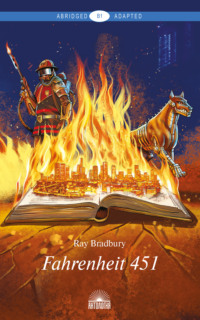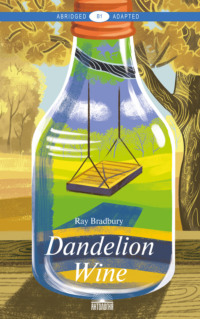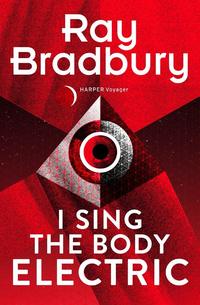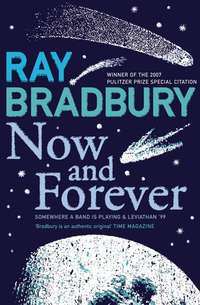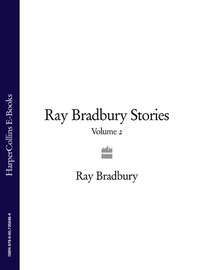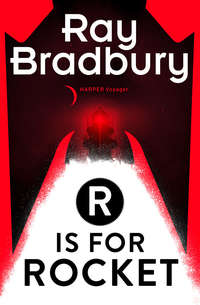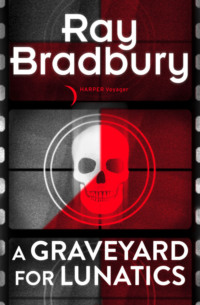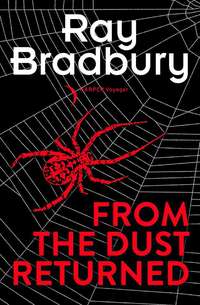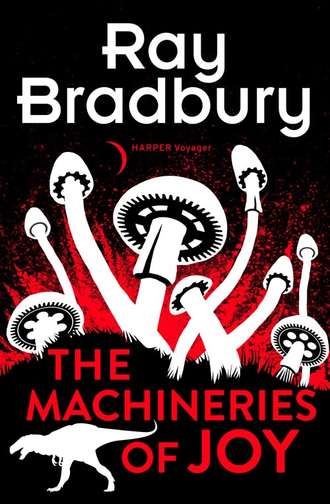
Полная версия
The Machineries of Joy
“If need be, yes,” said Pastor Sheldon. “It’s the Lord’s space and the Lord’s worlds in space, Father. We must not try to take our cathedrals with us, when all we need is an overnight case. The Church can be packed in a box no larger than is needed for the articles of the Mass, as much as these hands can carry. Allow Father Vittorini this, the people of the southern climes learned long ago to build in wax which melts and takes its shape in harmony with the motion and need of man. William, William, if you insist on building in hard ice, it will shatter when we break the sound barrier or melt and leave you nothing in the fire of the rocket blast.”
“That,” said Father Brian, “is a hard thing to learn at fifty years, Pastor.”
“But learn, I know you will,” said the pastor, touching his shoulder. “I set you a task: to make peace with the Italian priest. Find some way tonight for a meeting of minds. Sweat at it, Father. And, first off, since our library is meager, hunt for and find the space encyclical, so we’ll know what we’re yelling about.”
A moment later the pastor was gone.
Father Brian listened to the dying sound of those swift feet—as if a white ball were flying high in the sweet blue air and the pastor were hurrying in for a fine volley.
“Irish but not Irish,” he said. “Almost but not quite Italian. And now what are we, Patrick?”
“I begin to wonder,” was the reply.
And they went away to a larger library wherein might be hid the grander thoughts of a Pope on a bigger space.
A long while after supper that night, in fact almost at bedtime, Father Kelly, sent on his mission, moved about the rectory tapping on doors and whispering.
Shortly before ten o’clock, Father Vittorini came down the stairs and gasped with surprise.
Father Brian, at the unused fireplace, warming himself at the small gas heater which stood on the hearth, did not turn for a moment.
A space had been cleared and the brute television set moved forward into a circle of four chairs, amongst which stood two small taborettes on which stood two bottles and four glasses. Father Brian had done it all, allowing Kelly to do nothing. Now he turned, for Kelly and Pastor Sheldon were arriving.
The pastor stood in the entryway and surveyed the room. “Splendid.” He paused and added, “I think. Let me see now …” He read the label on one bottle. “Father Vittorini is to sit here.”
“By the Irish Moss?” asked Vittorini.
“The same,” said Father Brian.
Vittorini, much pleased, sat.
“And the rest of us will sit by the Lachryma Christi, I take it?” said the pastor.
“An Italian drink, Pastor.”
“I think I’ve heard of it,” said the pastor, and sat.
“Here.” Father Brian hurried over and, without looking at Vittorini, poured his glass a good way up with the Moss. “An Irish transfusion.”
“Allow me.” Vittorini nodded his thanks and arose, in turn, to pour the others’ drinks. “The tears of Christ and the sunlight of Italy,” he said. “And now, before we drink, I have something to say.”
The others waited, looking at him.
“The papal encyclical on space travel,” he said at last, “does not exist.”
“We discovered that,” said Kelly, “a few hours ago.”
“Forgive me, Fathers,” said Vittorini. “I am like the fisherman on the bank who, seeing fish, throws out more bait. I suspected, all along, there was no encyclical. But every time it was brought up, about town, I heard so many priests from Dublin deny it existed, I came to think it must! They would not go check the item, for they feared it existed. I would not, in my pride, do research, for I feared it did not exist. So Roman pride or Cork pride, it’s all the same. I shall go on retreat soon and be silent for a week, Pastor, and do penance.”
“Good, Father, good.” Pastor Sheldon rose. “Now I’ve a small announcement. A new priest arrives here next month. I’ve thought long on it. The man is Italian, born and raised in Montreal.”
Vittorini closed one eye and tried to picture this man to himself.
“If the Church must be all things to all people,” said the pastor, “I am intrigued with the thought of hot blood raised in a cold climate, as this new Italian was, even as I find it fascinating to consider myself, cold blood raised in California. We’ve needed another Italian here to shake things up, and this Latin looks to be the sort will shake even Father Vittorini. Now will someone offer a toast?”
“May I, Pastor?” Father Vittorini rose again, smiling gently, his eyes darkly aglow, looking at this one and now that of the three. He raised his glass. “Somewhere did Blake not speak of the Machineries of Joy? That is, did not God promote environments, then intimidate those Natures by provoking the existence of flesh, toy men and women, such as are we all? And thus happily sent forth, at our best, with good grace and fine wit, on calm noons, in fair climes, are we not God’s Machineries of Joy?”
“If Blake said that,” said Father Brian, “I take it all back. He never lived in Dublin!”
All laughed together.
Vittorini drank the Irish Moss and was duly speechless.
The others drank the Italian wine and grew mellow, and in his mellowness Father Brian cried softly, “Vittorini, now, will you, unholy as it is, tune on the ghost?”
“Channel Nine?”
“Nine it is!”
And while Vittorini dialed the knobs Father Brian mused over his drink, “Did Blake really say that?”
“The fact is, Father,” said Vittorini, bent to the phantoms coming and going on the screen, “he might have, if he’d lived today. I wrote it down myself tonight.”
All watched the Italian with some awe. Then the TV gave a hum and came clear, showing a rocket, a long way off, getting ready.
“The machineries of joy,” said Father Brian. “Is that one of them you’re tuning in? And is that another sitting there, the rocket on its stand?”
“It could be, tonight,” murmured Vittorini. “If the thing goes up, and a man in it, all around the world, and him still alive, and us with him, though we just sit here. That would be joyful indeed.”
The rocket was getting ready, and Father Brian shut his eyes for a moment. Forgive me, Jesus, he thought, forgive an old man his prides, and forgive Vittorini his spites, and help me to understand what I see here tonight, and let me stay awake if need be, in good humor, until dawn, and let the thing go well, going up and coming down, and think of the man in that contraption, Jesus, think of and be with him. And help me, God, when the summer is young, for, sure as fate on Fourth of July evening there will be Vittorini and the kids from around the block, on the rectory lawn, lighting sky-rockets. All them there watching the sky, like the morn of the Redemption, and help me, O Lord, to be as those children before the great night of time and void where you abide. And help me to walk forward, Lord, to light the next rocket Independence Night, and stand with the Latin father, my face suffused with that same look of the delighted child in the face of the burning glories you put near our hand and bid us savor.
He opened his eyes.
Voices from far Canaveral were crying in a wind of time. Strange phantom powers loomed upon the screen. He was drinking the last of the wine when someone touched his elbow gently.
“Father,” said Vittorini, near. “Fasten your seat belt.”
“I will,” said Father Brian. “I will. And many thanks.”
He sat back in his chair. He closed his eyes. He waited for the thunder. He waited for the fire. He waited for the concussion and the voice that would teach a silly, a strange, a wild and miraculous thing:
How to count back, ever backward … to zero.
The One Who Waits
I live in a well. I live like smoke in the well. Like vapor in a stone throat. I don’t move. I don’t do anything but wait. Overhead I see the cold stars of night and morning, and I see the sun. And sometimes I sing old songs of this world when it was young. How can I tell you what I am when I don’t know? I cannot. I am simply waiting. I am mist and moonlight and memory. I am sad and I am old. Sometimes I fall like rain into the well. Spider webs are startled into forming where my rain falls fast, on the water surface. I wait in cool silence and there will be a day when I no longer wait.
Now it is morning. I hear a great thunder. I smell fire from a distance. I hear a metal crashing. I wait. I listen.
Voices. Far away.
“All right!”
One voice. An alien voice. An alien tongue I cannot know. No word is familiar. I listen.
“Send the men out!”
A crunching in crystal sands.
“Mars! So this is it!”
“Where’s the flag?”
“Here, sir.”
“Good, good.”
The sun is high in the blue sky and its golden rays fill the well and I hang like a flower pollen, invisible and misting in the warm light.
Voices.
“In the name of the Government of Earth, I proclaim this to be the Martian Territory, to be equally divided among the member nations.”
What are they saying? I turn in the sun, like a wheel, invisible and lazy, golden and tireless.
“What’s over here?”
“A well!”
“No!”
“Come on. Yes!”
The approach of warmth. Three objects bend over the well mouth, and my coolness rises to the objects.
“Great!”
“Think it’s good water?”
“We’ll see.”
“Someone get a lab test bottle and a dropline.”
“I will!”
A sound of running. The return.
“Here we are.”
I wait.
“Let it down. Easy.”
Glass shines, above, coming down on a slow line.
The water ripples softly as the glass touches and fills. I rise in the warm air toward the well mouth.
“Here we are. You want to test this water, Regent?”
“Let’s have it.”
“What a beautiful well. Look at that construction. How old you think it is?”
“God knows. When we landed in that other town yesterday Smith said there hasn’t been life on Mars in ten thousand years.”
“Imagine.”
“How is it, Regent? The water.”
“Pure as silver. Have a glass.”
The sound of water in the hot sunlight. Now I hover like a dust, a cinnamon, upon the soft wind.
“What’s the matter, Jones?”
“I don’t know. Got a terrible headache. All of a sudden.”
“Did you drink the water yet?”
“No, I haven’t. It’s not that. I was just bending over the well and all of a sudden my head split. I feel better now.”
Now I know who I am.
My name is Stephen Leonard Jones and I am twenty-five years old and I have just come in a rocket from a planet called Earth and I am standing with my good friends Regent and Shaw by an old well on the planet Mars.
I look down at my golden fingers, tan and strong. I look at my long legs and at my silver uniform and at my friends.
“What’s wrong, Jones?” they say.
“Nothing,” I say, looking at them. “Nothing at all.”
The food is good. It has been ten thousand years since food. It touches the tongue in a fine way and the wine with the food is warming. I listen to the sound of voices. I make words that I do not understand but somehow understand. I test the air.
“What’s the matter, Jones?”
I tilt this head of mine and rest my hands holding the silver utensils of eating. I feel everything.
“What do you mean?” this voice, this new thing of mine, says.
“You keep breathing funny. Coughing,” says the other man.
I pronounce exactly. “Maybe a little cold coming on.”
“Check with the doc later.”
I nod my head and it is good to nod. It is good to do several things after ten thousand years. It is good to breathe the air and it is good to feel the sun in the flesh deep and going deeper and it is good to feel the structure of ivory, the fine skeleton hidden in the warming flesh, and it is good to hear sounds much clearer and more immediate than they were in the stone deepness of a well. I sit enchanted.
“Come out of it, Jones. Snap to it. We got to move!”
“Yes,” I say, hypnotized with the way the word forms like water on the tongue and falls with slow beauty out into the air.
I walk and it is good walking. I stand high and it is a long way to the ground when I look down from my eyes and my head. It is like living on a fine cliff and being happy there.
Regent stands by the stone well, looking down. The others have gone murmuring to the silver ship from which they came.
I feel the fingers of my hand and the smile of my mouth.
“It is deep,” I say.
“Yes.”
“It is called a Soul Well.”
Regent raises his head and looks at me. “How do you know that?”
“Doesn’t it look like one?”
“I never heard of a Soul Well.”
“A place where waiting things, things that once had flesh, wait and wait,” I say, touching his arm.
The sand is fire and the ship is silver fire in the hotness of the day and the heat is good to feel. The sound of my feet in the hard sand. I listen. The sound of the wind and the sun burning the valleys. I smell the smell of the rocket boiling in the noon. I stand below the port.
“Where’s Regent?” someone says.
“I saw him by the well,” I reply.
One of them runs toward the well. I am beginning to tremble. A fine shivering tremble, hidden deep, but becoming very strong. And for the first time I hear it, as if it too were hidden in a well. A voice calling deep within me, tiny and afraid. And the voice cries, Let me go, let me go, and there is a feeling as if something is trying to get free, a pounding of labyrinthine doors, a rushing down dark corridors and up passages, echoing and screaming.
“Regent’s in the well!”
The men are running, all five of them. I run with them but now I am sick and the trembling is violent.
“He must have fallen. Jones, you were here with him. Did you see? Jones? Well, speak up, man.”
“What’s wrong, Jones?”
I fall to my knees, the trembling is so bad.
“He’s sick. Here, help me with him.”
“The sun.”
“No, not the sun,” I murmur.
They stretch me out and the seizures come and go like earthquakes and the deep hidden voice in me cries, This is Jones, this is me, that’s not him, that’s not him, don’t believe him, let me out, let me out! And I look up at the bent figures and my eyelids flicker. They touch my wrists.
“His heart is acting up.”
I close my eyes. The screaming stops. The shivering ceases.
I rise, as in a cool well, released.
“He’s dead,” says someone.
“Jones is dead.”
“From what?”
“Shock, it looks like.”
“What kind of shock?” I say, and my name is Sessions and my lips move crisply, and I am the captain of these men. I stand among them and I am looking down at a body which lies cooling on the sands. I clap both hands to my head.
“Captain!”
“It’s nothing,” I say, crying out. “Just a headache. I’ll be all right. There. There,” I whisper. “It’s all right now.”
“We’d better get out of the sun, sir.”
“Yes,” I say, looking down at Jones. “We should never have come. Mars doesn’t want us.”
We carry the body back to the rocket with us, and a new voice is calling deep in me to be let out.
Help, help. Far down in the moist earthen-works of the body. Help, help! in red fathoms, echoing and pleading.
The trembling starts much sooner this time. The control is less steady.
“Captain, you’d better get in out of the sun, you don’t look too well, sir.”
“Yes,” I say. “Help,” I say.
“What, sir?”
“I didn’t say anything.”
“You said ‘Help,’ sir.”
“Did I, Matthews, did I?”
The body is laid out in the shadow of the rocket and the voice screams in the deep underwater catacombs of bone and crimson tide. My hands jerk. My mouth splits and is parched. My nostrils fasten wide. My eyes roll. Help, help, oh help, don’t, don’t, let me out, don’t, don’t.
“Don’t,” I say.
“What, sir?”
“Never mind,” I say. “I’ve got to get free,” I say. I clap my hand to my mouth.
“How’s that, sir?” cries Matthews.
“Get inside, all of you, go back to Earth!” I shout.
A gun is in my hand. I lift it.
“Don’t, sir!”
An explosion. Shadows run. The screaming is cut off. There is a whistling sound of falling through space.
After ten thousand years, how good to die. How good to feel the sudden coolness, the relaxation. How good to be like a hand within a glove that stretches out and grows wonderfully cold in the hot sand. Oh, the quiet and the loveliness of gathering, darkening death. But one cannot linger on.
A crack, a snap.
“Good God, he’s killed himself!” I cry, and open my eyes and there is the captain lying against the rocket, his skull split by a bullet, his eyes wide, his tongue protruding between his white teeth. Blood runs from his head. I bend to him and touch him. “The fool,” I say. “Why did he do that?”
The men are horrified. They stand over the two dead men and turn their heads to see the Martian sands and the distant well where Regent lies lolling in deep waters. A croaking comes out of their dry lips, a whimpering, a childish protest against this awful dream.
The men turn to me.
After a long while, one of them says, “That makes you captain, Matthews.”
“I know,” I say slowly.
“Only six of us left.”
“Good God, it happened so quick!”
“I don’t want to stay here, let’s get out!”
The men clamor. I go to them and touch them now, with a confidence which almost sings in me. “Listen,” I say, and touch their elbows or their arms or their hands.
We all fall silent.
We are one.
No, no, no, no, no, no! Inner voices crying, deep down and gone into prisons beneath exteriors.
We are looking at each other. We are Samuel Matthews and Raymond Moses and William Spaulding and Charles Evans and Forrest Cole and John Summers, and we say nothing but look upon each other and our white faces and shaking hands.
We turn, as one, and look at the well.
“Now,” we say.
No, no, six voices scream, hidden and layered down and stored forever.
Our feet walk in the sand and it is as if a great hand with twelve fingers were moving across the hot sea bottom.
We bend to the well, looking down. From the cool depths six faces peer back up at us.
One by one we bend until our balance is gone, and one by one drop into the mouth and down through cool darkness into the cold waters.
The sun sets. The stars wheel upon the night sky. Far out, there is a wink of light. Another rocket coming, leaving red marks on space.
I live in a well. I live like smoke in a well. Like vapor in a stone throat. Overhead I see the cold stars of night and morning, and I see the sun. And sometimes I sing old songs of this world when it was young. How can I tell you what I am when even I don’t know? I cannot.
I am simply waiting.
Tyrannosaurus Rex
He opened a door on darkness. A voice cried, “Shut it!” It was like a blow in the face. He jumped through. The door banged. He cursed himself quietly. The voice, with dreadful patience, intoned, “Jesus. You Terwilliger?”
“Yes,” said Terwilliger. A faint ghost of screen haunted the dark theater wall to his right. To his left, a cigarette wove fiery arcs in the air as someone’s lips talked swiftly around it.
“You’re five minutes late!”
Don’t make it sound like five years, thought Terwilliger.
“Shove your film in the projection room door. Let’s move.”
Terwilliger squinted.
He made out five vast loge seats that exhaled, breathed heavily as amplitudes of executive life shifted, leaning toward the middle loge where, almost in darkness, a little boy sat smoking.
No, thought Terwilliger, not a boy. That’s him. Joe Clarence. Clarence the Great.
For now the tiny mouth snapped like a puppet’s, blowing smoke. “Well?”
Terwilliger stumbled back to hand the film to the projectionist, who made a lewd gesture toward the loges, winked at Terwilliger and slammed the booth door.
“Jesus,” sighed the tiny voice. A buzzer buzzed. “Roll it, projection!”
Terwilliger probed the nearest loge, struck flesh, pulled back and stood biting his lips.
Music leaped from the screen. His film appeared in a storm of drums:
TYRANNOSAURUS REX: The Thunder Lizard.
Photographed in stop-motion animation with miniatures created by John Terwilliger. A study in life-forms on Earth one billion years before Christ.
Faint ironic applause came softly patting from the baby hands in the middle loge.
Terwilliger shut his eyes. New music jerked him alert. The last titles faded into a world of primeval sun, mist, poisonous rain and lush wilderness. Morning fogs were strewn along eternal seacoasts where immense flying dreams and dreams of nightmare scythed the wind. Huge triangles of bone and rancid skin, of diamond eye and crusted tooth, pterodactyls, the kites of destruction, plunged, struck prey, and skimmed away, meat and screams in their scissor mouths.
Terwilliger gazed, fascinated.
In the jungle foliage now, shiverings, creepings, insect jitterings, antennae twitchings, slime locked in oily fatted slime, armor skinned to armor, in sun glade and shadow moved the reptilian inhabitors of Terwilliger’s mad remembrance of vengeance given flesh and panic taking wing.
Brontosaur, stegosaur, triceratops. How easily the clumsy tonnages of name fell from one’s lips.
The great brutes swung like ugly machineries of war and dissolution through moss ravines, crushing a thousand flowers at one footfall, snouting the mist, ripping the sky in half with one shriek.
My beauties, thought Terwilliger, my little lovelies. All liquid latex, rubber sponge, ball-socketed steel articulature; all night-dreamed, clay-molded, warped and welded, riveted and slapped to life by hand. No bigger than my fist, half of them; the rest no larger than this head they sprang from.
“Good Lord,” said a soft admiring voice in the dark.
Step by step, frame by frame of film, stop motion by stop motion, he, Terwilliger, had run his beasts through their postures, moved each a fraction of an inch, photographed them, moved them another hair, photographed them, for hours and days and months. Now these rare images, this eight hundred scant feet of film, rushed through the projector.
And lo! he thought. I’ll never get used to it. Look! They come alive!
Rubber, steel, clay, reptilian latex sheath, glass eye, porcelain fang, all ambles, trundles, strides in terrible prides through continents as yet unmanned, by seas as yet unsalted, a billion years lost away. They do breathe. They do smite air with thunders. Oh, uncanny!
I feel, thought Terwilliger, quite simply, that there stands my Garden, and these my animal creations which I love on this Sixth Day, and tomorrow, the Seventh, I must rest.
“Lord,” said the soft voice again.
Terwilliger almost answered, “Yes?”
“This is beautiful footage, Mr. Clarence,” the voice went on.
“Maybe,” said the man with a boy’s voice.
“Incredible animation.”
“I’ve seen better,” said Clarence the Great.
Terwilliger stiffened. He turned from the screen where his friends lumbered into oblivion, from butcheries wrought on architectural scales. For the first time he examined his possible employers.
“Beautiful stuff.”
This praise came from an old man who sat to himself far across the theater, his head lifted forward in amaze toward that ancient life.
“It’s jerky. Look there!” The strange boy in the middle loge half rose, pointing with the cigarette in his mouth. “Hey, was that a bad shot. You see?”


